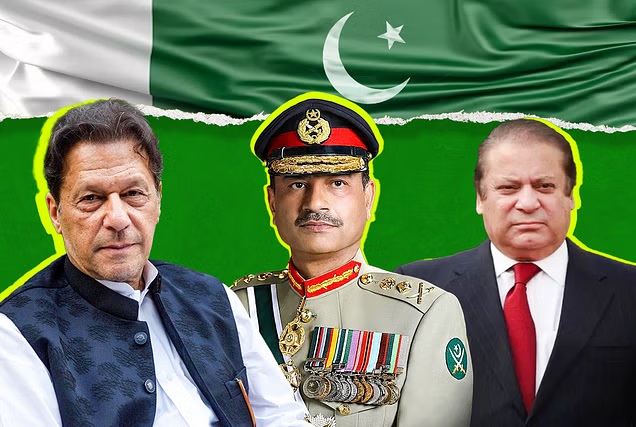The outcome of the 2024 elections in Pakistan suggests that if free and fair elections had taken place, the Pakistan Tehreek-e-Insaf (PTI) led by Imran Khan would have come to power. However, it seems that the establishment, particularly the Pakistan Army, did not favor this outcome. The establishment skillfully manipulated the situation by disqualifying Imran Khan and forcing PTI members to contest independently. This tactic ensured that PTI did not receive the reserved seat quota for women and minority candidates, preventing them from forming a government despite the appearance of a fair election. As the results came in, PTI-backed independent candidates were on track to secure a majority, but there were allegations of manipulation by the establishment to keep them below the threshold required to come to power. Consequently, there have been large protests by PTI supporters.
The 2024 elections saw the establishment play a different game to ensure that no stakeholder could claim a simple majority to form the government. This allows the establishment to manipulate the numbers and select a puppet prime minister behind the scenes. This selected prime minister can be projected as an elected leader internationally, but they can easily be displaced by the establishment. The current political scenario has been orchestrated in a way that no civilian leader in Pakistan can challenge the power of the Army.
The Pakistani army has remained the center of power in Pakistan for several reasons. Throughout its existence, Pakistan has been accustomed to being governed by the army. Out of the 77 years of its independence, the army has directly ruled the country for a significant period, while in the remaining time, it has exercised control through selected prime ministers. One of the main reasons for this is the repeated wars with India since independence. The army has successfully convinced the public that India is the biggest existential threat, and only the army can protect Pakistan from this threat. As a result, the army has maintained control over all levers of power. The “India threat theory” gained more prominence after the humiliating defeat in the 1971 war, which led to East Pakistan becoming the independent country of Bangladesh. Even when the army is not ruling directly, it maintains overriding authority over defense, internal security, foreign affairs, and the economy.
The army’s narrative is also supported by exposing the corruption of politicians at opportune moments. While army generals are not immune to corruption, they have managed to control their exposure to the public due to their hold over relevant agencies and establishments, including the judiciary.
Imran Khan, who seemed to be the army’s chosen candidate during the last election, eventually clashed with the establishment over some issues. This led to PTI supporters attacking army establishments, causing a rift between Khan and the deep state. Since then, the establishment has been trying various alternatives to keep Khan out of power, even considering rehabilitating Nawaz Sharif and presenting him as a viable option. The army wants to ensure that it faces no challenges from politicians. However, the army still faces challenges from terrorist organizations like the Tehreek-e-Taliban-e-Pakistan (TTP) and the Baluchistan Liberation Army. These groups in Khyber Pakhtunkhwa and Baluchistan actively target the Pakistan army, and this situation is unlikely to change regardless of the election outcome.
With a hung parliament and PTI-backed independent candidates claiming victory, the PML(N), as the largest political party, may gather the required numbers by encouraging other political parties and independent candidates to join forces. The recent statement by the Pakistan army chief suggests that political parties should come together to form a government. There might be adjustments and power-sharing arrangements among the concerned parties, but a weak democratic government dependent on the Pakistan army will emerge, facing an unprecedented economic and political crisis.
If the puppet regime fails to resolve the crisis, becomes unpopular, or deviates from the army’s narrative (such as improving relations with India or hindering terrorist operations), the army can reinstate a popular leader like Imran Khan through a vote of no confidence at the appropriate time. This process of “dry-cleaning” a leader’s image has been done before, as seen with Nawaz Sharif.
The United States and China overlook the democratic backsliding in Pakistan due to its strategic location and control over certain terrorist groups. The U.S. needs Pakistan’s cooperation in launching operations against organizations like Al-Qaeda in Afghanistan. Historically, the U.S. has supported dictatorships in Pakistan to serve its strategic interests in the Af-Pak region. It is accustomed to dealing directly with the Pakistan army and turns a blind eye to the country’s sham democratic credentials. The non-committal statements from the U.S. State Department indicate that they will work with whichever party is in power, knowing that ultimately they will have to deal with the army and the establishment, which remains unchanged. China also relies on Pakistan’s strategic significance for its China-Pakistan Economic Corridor (CPEC) projects and views the army as a useful tool in creating nuisance for India through proxy warfare. Both the U.S. and China do not see any long-term stability in Pakistan’s political leadership and prefer to work with the army, which they perceive as relatively reliable. The Pakistan army will continue to disregard international criticism of its treatment of PTI and Imran Khan, with the support of China, a member of the P5.


